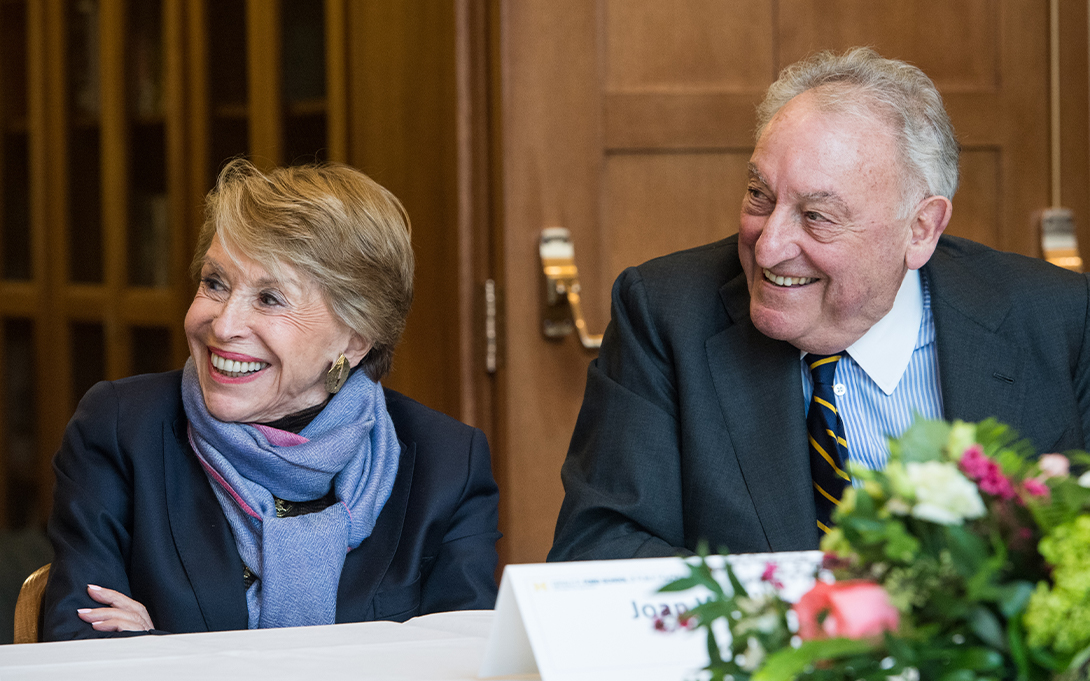
New gift from Joan and Sanford Weill supports education and employment initiatives
By David Pratt
Longtime friends of the Ford School Joan and Sanford Weill have made a generous new investment in the school's work with a gift of $5 million.
Half of the Weills’ gift establishes the Joan and Sanford I. Weill Youth Empowerment Fund, which will improve education and employment opportunities for disadvantaged youth from the Detroit area.
The other half establishes the Weill Scholars Fund, providing tuition support and stipends for promising Ford School graduate students from underrepresented backgrounds, such as first-generation and low-income students. The gift “will help the school attract and enroll a diverse group of future leaders, which is key to building a more just, more equitable, and more inclusive society,” says the Ford School’s dean Michael S. Barr. “We need these future public policy leaders now more than ever.”
The seeds for Joan and Sanford Weill’s broad philanthropic commitment to education were planted in 1980, when Sanford Weill partnered with the New York City Board of Education to create an academy of finance within John Dewey High School in Gravesend, Brooklyn. The academy gave direction to young people in an economically challenged community, and it answered the need for an educated workforce in what we now call STEM disciplines.
Weill’s original idea became a global network, the National Academy Foundation, now known as NAF. Today, in Detroit alone, more than 2,500 students attend 20 NAF academies in 15 high schools. Curricula include finance, hospitality and tourism, information technology, engineering, and health sciences. Last year, 99% of NAF seniors nationally graduated high school, with 87% planning to go to college. For some Detroit youth, college may mean the University of Michigan, where the new Youth Empowerment Fund will dramatically boost existing programs designed to support high school students aspiring to higher education at a range of schools.
One such program is the Michigan Engineering Zone (MEZ), a robotics and engineering outreach hub in Detroit that is hosted by the U-M College of Engineering each spring for more than 350 high school students and teachers, including many from NAF academies in Detroit. The program gives high school robotics teams resources and training to design, build, and test their robots, preparing them for competitions. MEZ provides wrap-around services as well, such as college application workshops, writing workshops, and food each day. Nearly all students come from low-income communities, and more than 90% will go to college.
Now, MEZ can do even more.
“A STEM summer camp was always part of our vision,” says Jeanne Murabito, executive director of Engineering’s Office of Student Affairs, “but it was not feasible until we received this generous gift from the Weills.” Pre-pandemic, Murabito and colleagues were planning to use the Weill Youth Empowerment Fund to support sixty students from Detroit NAF academies in taking STEM classes and workshops this summer. Students were also going to spend time at the Ford School, to understand the interaction of STEM and public policy, with MEZ also sponsoring events in Detroit during the school year.
Now, with spring and summer in-person programs not possible in the wake of COVID-19, faculty and administrators are busy moving this important learning online. The Ford School’s Elisabeth Gerber will run an online policy simulation, and the summer camp is continuing virtually. “The summer camp--even from a distance--will be life-changing for the students,” says Murabito. “These young people will network with and learn from folks in STEM from across the university.”
“In the past,” Murabito notes, “these students would not have been exposed to U-M and might have been discouraged from applying here. The Weill gift is transformational. It changes the game for college readiness and for inclusivity in the STEM fields these students go into.”
Delann Pillavant, a MEZ student from Detroit’s Pershing High School, is a big believer in the concept. Delann has been accepted to U-M’s College of Engineering for fall 2020. She loves MEZ, and the summer camp idea. “The MEZ experience has been priceless,” she says. “Without it, I don’t know where I would be. The summer camp will give kids in STEM fields even more exposure and experience to compete with peers who come from more money.”
The Weill gift will also help the Youth Policy Lab (YPL), and the Education Policy Initiative (EPI) at Ford. YPL and EPI are comprised of data experts from across the campus who help state and local governments analyze public education and youth employment programs. Professor Brian Jacob is a faculty co-director and co-founder. “The Weill gift is amazing,” Jacob says. “We can give NAF a clear picture of how their students are doing.” EPI co-founder and co-director Susan Dynarski noted that “I love the Weills’ willingness to collaborate with public school systems with a data-driven strategy to advance educational opportunity.”
Dean Barr agrees. “Joan and Sanford have a deep commitment to educational advancement for economically disadvantaged young people with the drive and talent to succeed,” he says. “They are intellectually curious, steadfast in their support, and incredibly generous.”
The Weills are signers of the Giving Pledge, the international movement founded by Bill and Melinda Gates and Warren Buffett, comprising more than 200 philanthropists who have committed the greater part of their wealth to charity. On the Giving Pledge website, the Weills say, “Education and partnership are at the heart of everything we do philanthropically.”
The Weills latest generous gift to the Ford School will grow partnerships across campus and across southeast Michigan--in support of a brighter future for young people interested in public policy.
Below is a formatted version of this article from State & Hill, the magazine of the Ford School. View the entire Spring 2020 State & Hill.